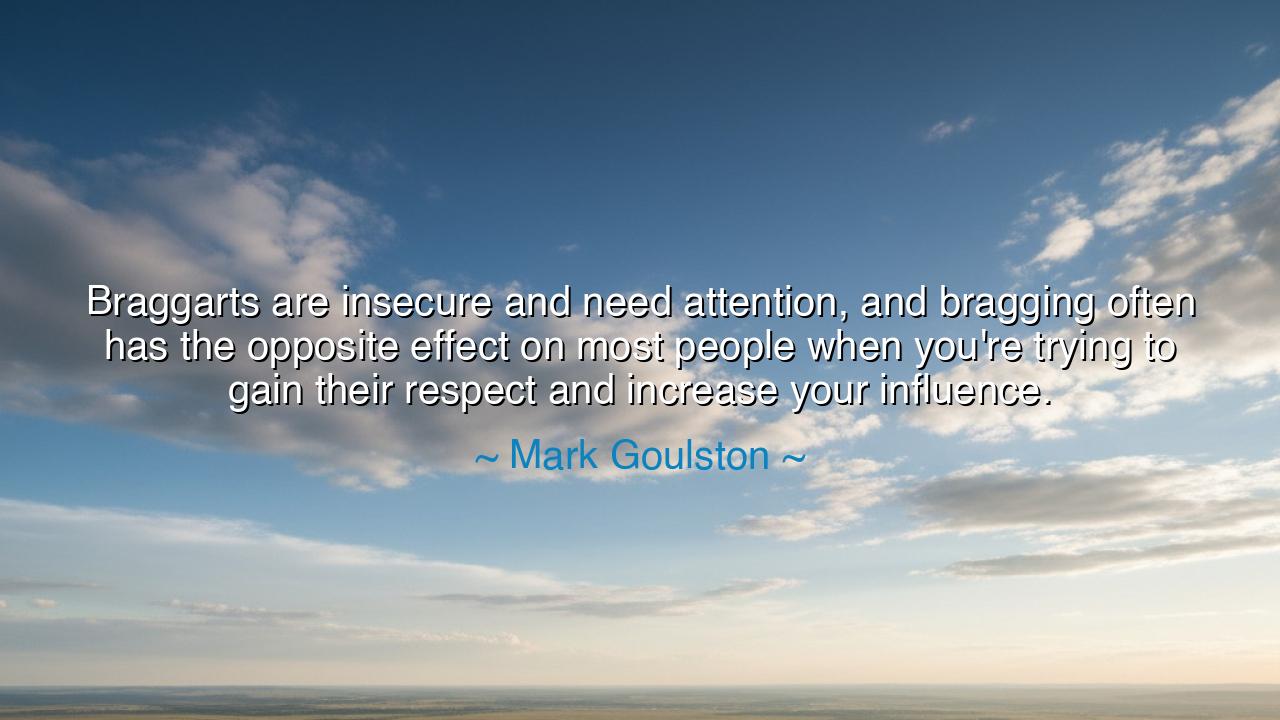
Braggarts are insecure and need attention, and bragging often has
Braggarts are insecure and need attention, and bragging often has the opposite effect on most people when you're trying to gain their respect and increase your influence.






Hearken to the words of Mark Goulston, whose wisdom pierces the illusions of pride and the subtleties of influence. He observes that braggarts are insecure and need attention, and warns that bragging often has the opposite effect on most people when you’re trying to gain their respect and increase your influence. In these words lies a timeless truth: true esteem and influence arise not from loud declarations of one’s prowess, but from humility, authenticity, and the quiet strength of competence.
Since the earliest days of human society, philosophers and leaders have cautioned against the folly of self-aggrandizement. In ancient Athens, Socrates taught that wisdom begins with the recognition of one’s own ignorance, and that ostentation often undermines credibility. Goulston’s observation echoes this principle: the desire to impress through boastfulness reveals insecurity, while the path to genuine respect is paved with humility, self-awareness, and measured expression.
Consider the story of Cincinnatus, the Roman statesman who, called to serve as dictator in a time of crisis, accepted the role without fanfare, led Rome to victory, and returned to his plow once the task was complete. He sought neither praise nor attention; his influence and respect were earned through action and integrity, not through proclamation. Like Cincinnatus, one who brags may inadvertently diminish influence, while those who act with quiet strength cultivate enduring admiration.
Goulston’s reflection also underscores a psychological reality: humans intuitively detect insecurity behind ostentation. Bragging, though intended to command attention or respect, often signals vulnerability and a need for validation, prompting observers to respond with skepticism rather than esteem. Ancient sages, from Confucius to Seneca, recognized that outward displays of superiority rarely inspire loyalty or trust, while modesty paired with competence draws others willingly into admiration and collaboration.
In the modern world, this lesson retains profound relevance. Leaders, professionals, and creators who seek to influence must temper their desire for recognition with self-restraint. Excessive boasting alienates peers, while demonstrating skill through results, integrity, and thoughtful engagement builds authentic respect. Influence is earned, not announced, and the subtle art of persuasion depends on the perception of sincerity and confidence rather than loud proclamation.
The moral lesson is clear: cultivate competence, act with humility, and allow your actions to speak more powerfully than your words. Respect and influence are fragile constructs that cannot be conjured through ego, but are nurtured through consistency, authenticity, and measured expression. Goulston’s insight reminds us that the pursuit of admiration through boastfulness is often self-defeating, while quiet integrity fosters lasting esteem.
Practical guidance flows naturally: avoid excessive self-promotion, acknowledge the contributions of others, and let achievements demonstrate capability. When seeking influence, prioritize listening, empathy, and competence over proclamations. In doing so, one not only avoids the pitfalls of braggadocio but cultivates genuine authority, trust, and respect.
Thus, heed the wisdom of Mark Goulston: humility is the lodestar of influence, and restraint is the pathway to respect. The braggart, though loud, reveals insecurity, while the humble, competent individual quietly inspires admiration and loyalty. Let actions, not boasts, shape your reputation, and allow authenticity to guide your pursuit of influence, for it is in measured, sincere deeds that enduring respect and power are forged.






AAdministratorAdministrator
Welcome, honored guests. Please leave a comment, we will respond soon